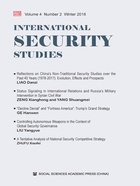
Refl ections on China’s Non-Traditional Security Studies over the Past 40 Years (1978-2017):Evolution, Eff ects and Prospects[1]
LIAO Danzi[2]
Abstract: Non-traditional security study (NTSS) in China has become an important school of thought and greatly influenced the research,reality and policies in the area of security.In the past 40 years from 1978 to 2017,China’s NTSS went through four stages that may be defined as gestation and genesis,conceptualization and awareness-building,self-reflection and clarification,and further construction and growth.In terms of contents,NTSS has been continuously enriched and has come to focus on specific subjects; in terms of its relations with state policy-making,NTSS was once neglected and marginalized but has now become a top priority on the national agenda.Now studies in this field are not only conducted for academic purposes,but also driven by technological advances,incidents and emergencies,policies of various actors and even changes in environments,and have gradually become institutionalized with the establishment of relevant organizations and institutes that are engaged in talents cultivation,information spreading,policy consultation and a network of research.Academically,scholars and researchers in this field have developed better awareness of the security discipline in general and this particular school of thought,and have promoted the “paradigm shift” in security thinking and the reshaping of “security civilization”,and thus helped the practices of security governance to be more comprehensive and internationalized through policies.However,a theoretical system is yet to be formed in China’s NTSS,which is not considered to be a full discipline with approaches not scientific enough and not widely recognized by peers in the academic community throughout the world.In the future,scholars and researchers in this field in China should make breakthroughs in the patterns of global security research,meta-question,analytical frameworks,theoretical system,disciplinary awareness,methodology,quantitative studies,and in-depth exploration of specific issues,and continue to promote dialogues with their counterparts in the rest of the world.
Keywords: non-traditional security studies,overall national security,shared security,security civilization,China School
In 1978,China ushered in the era of reform and opening-up.Due to the overall peaceful situation in the world,the redefinition of the principal contradiction facing the Chinese society and the consequent shift of government priority,China has gradually expanded its focus of attention in national growth and security,to include non-military topics in its agenda,which used to cover only “strategic armament”.Scholars have introduced the idea of “non-traditional security” into the country,and more emphasis has been given to the “issues of non-traditional security” in the public decision-making process.Under these circumstances,non-traditional security studies,or NTSS,began to germinate and take shape.A review of NTSS in China between 1978 and 2017 shows that despite a late start,it has developed with a strong momentum,and has now become a school of thought,producing an impressive number of research results and drawing increasing attention from the government.
So how did NTSS in China during this period develop? What features were displayed? In what way does this development affect academic research and reality? What are the factors that have driven the studies? And what kind of shifts and breakthroughs should be made in the future? An earnest answer to these questions will illustrate a very clear picture of the theoretical status,current trends and changes in policy in the area of non-traditional security in China.
At a time when China is increasingly involved and leads in global governance,when the China Discourse is going global,and its discourse system of philosophy and social sciences is being constructed,a systematic review and appropriate expression of the thinking among Chinese scholars is not only of academic interest but also a responsibility fallen on this generation to probe into the China Discourse,Chinese Thoughts and Chinese Wisdom.